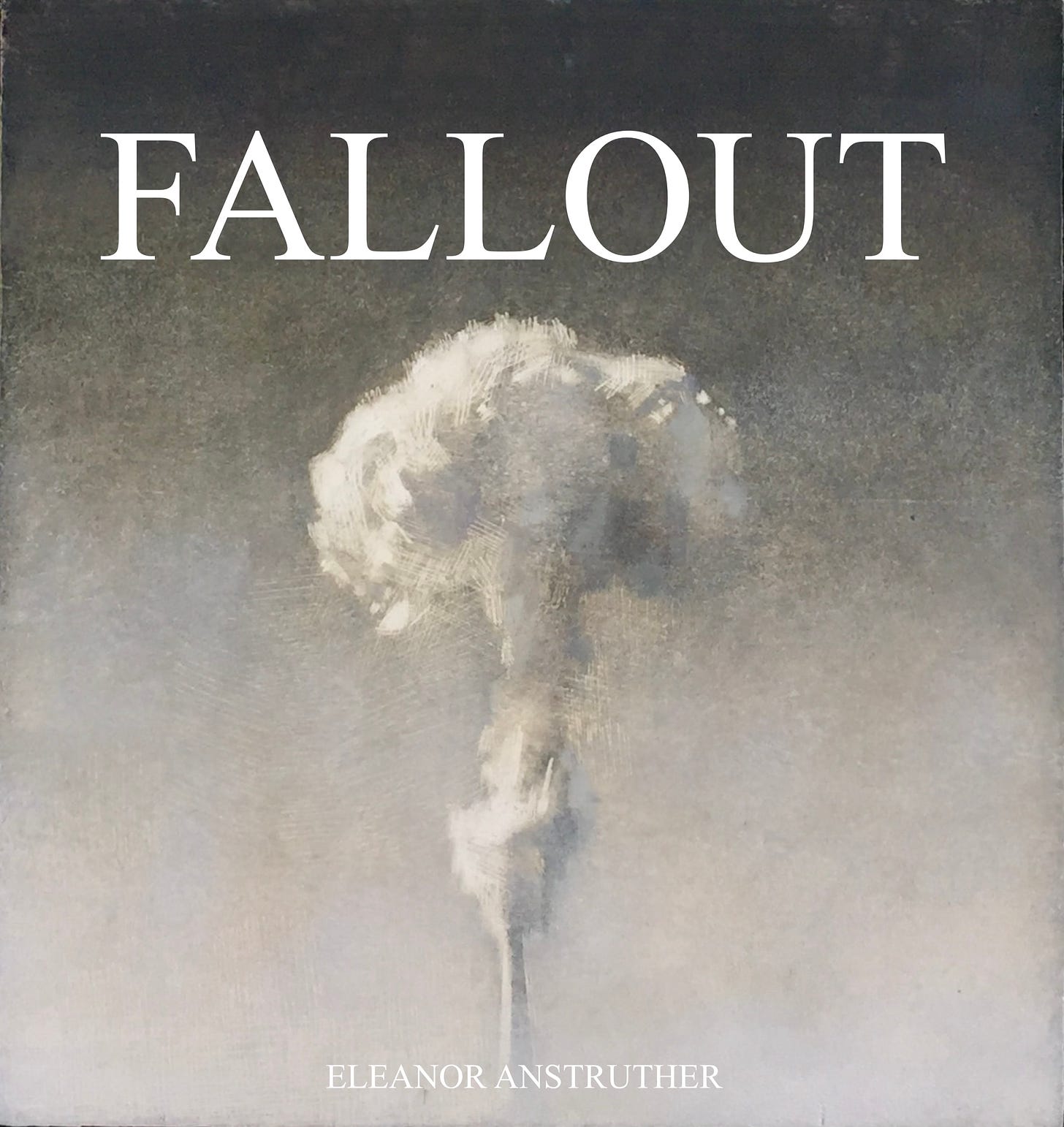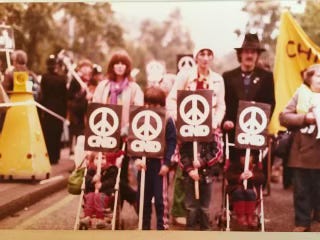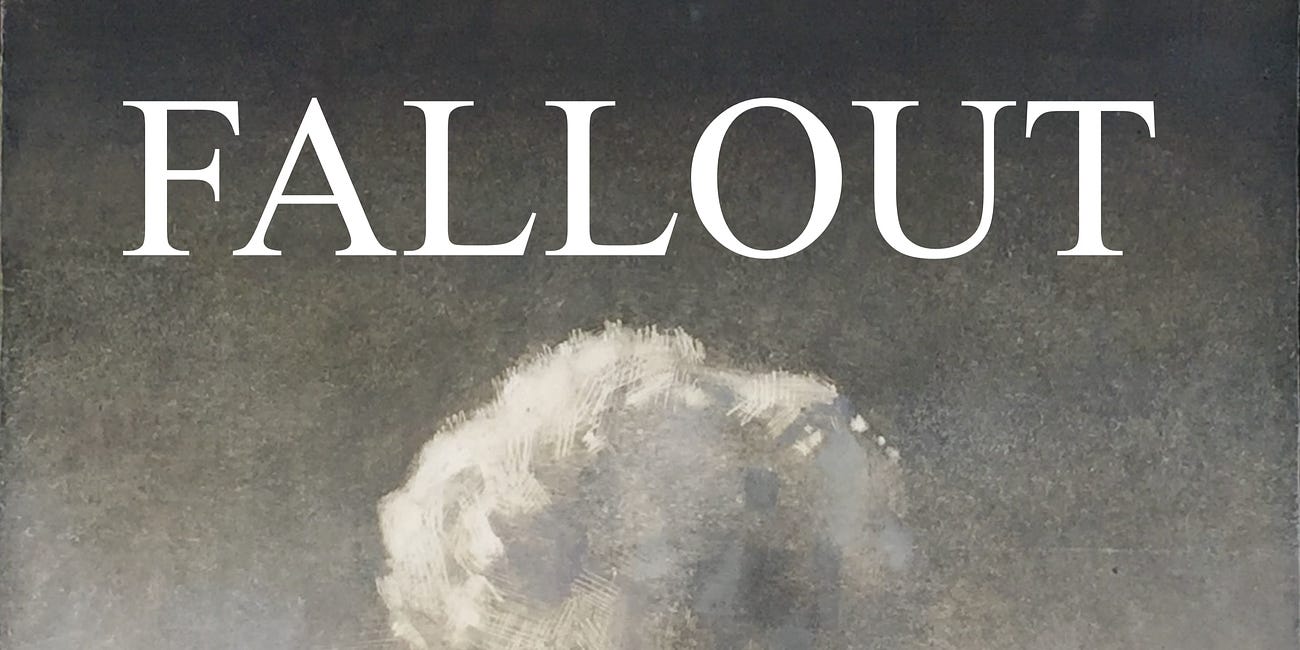She was almost hit by a car she was running that fast, it almost hit her as she leapt into the road outside their house, the brakes screeched and the man inside shouted and slammed his hand on the dashboard as if that was Bridget’s face or backside, as if that would show her but she skipped to the side and ran on, after she’d wiped off the shock. She heard her mum scream quickly and stop just as fast so as not alert her dad who’d come rushing if he heard, and Paul, too, the game of running away over for the better game of seeing his sister told off. But she didn’t give any of them the chance. She was away and running and the crumpled, smashed leaflet was in her hand.
At school she harassed the secretary.
“I’ve got photocopying that needs doing.”
“Who sent you?” The school secretary had large hair, large glasses, see-through frames, lipstick that made her narrow lips a narrow red line. She held out her hand.
“Miss Jenkins.”
Miss Jenkins was Bridget’s art teacher. Bridget didn’t have art today.
“She’s not in.”
“She gave it to me yesterday.”
“Then why didn’t you do it yesterday?” The school secretary was already up and out of her chair, going round the desk, towards the photocopier. Bridget had flattened the leaflet as much as she could, but it still looked like it had been bombed, crumpled, fractured, almost torn with hands smashing it. “Did she tell you to crease it too?” Held between forefinger and thumb, her face wrinkled as if the leaflet was a grenade soaked in blood, held away from her, dripping, might explode. She opened the large heavy lid of the photocopier and pressed it onto the smooth glass surface.
“It’s for a project.”
The school secretary sighed. “How many?” She pressed the button.
Bridget watched the green light shining from beneath the lid like a UFO arriving in a squashed land.
Three kids ran in with a teacher from the juniors. They went off on a current about losing their lunch boxes, a school trip, a coach waiting outside, and the school secretary stopped waiting by the machine.
Bridget said, “I need them in colour.”
They were coming out in black and white. The images almost indecipherable, the writing pale. But the school secretary had already moved on from Bridget’s problem, she was already behind her desk, her mind on other things, looking for a file and picking up the telephone while the teacher from the juniors tried to keep the little ones from squealing and breaking things, tried to make them stand in a line only they kept giggling till one of them wet themselves and then they all started crying but by then Bridget had her ten copies, and she was out of there.
The bell rang for assembly. Bridget ignored it.
In the art room she got out the bucket of fat felt tips and spread the ten sheets on the large metal table they used for gluing. She wiped it first. She wiped it and laid the ten copies side by side, two rows of four and one of three, the crumpled copy at the end of the line like, The poor relation, that’s what her mum would have called it; a blood red poor relation on the tail end of its black and white cousins. Sisters. Women only. In tiny writing at the bottom, it said men would be running the creche.
Dead quiet. Everyone at assembly. The plants on the windowsill waved in the breeze from the high up open windows that were always left open, even in winter.
*
She’d coloured in six of them when the art room door opened and Miss Jenkins came in looking flustered and pink in the nose as usual, her thin wispy hair waving like the plants in the slightest breeze, even her breath would do it. The second bell had rung ages ago, there’d been running feet and slamming doors and the sound of silence that meant lessons had begun and Bridget had ignored all of it. She wasn’t even sure where she was supposed to be. French. Who cared about that.
“Bridget Reynolds.” Corduroy skirt all brown and corduroy and red hair all straight and thin and her pointy nose and those flushed cheeks as if she’d been running. “Why aren’t you in lessons?”
“I’m doing my project.”
“I thought you were doing trees.” She leaned over her. “Where did you get this?”
Bridget had done her best to replicate the original. Her first two hadn’t been that good. She’d used the wrong red and the felt tip for the tiny lettering wasn’t small enough. But she’d got better and with the last one she’d found a crayon in the exact red she wanted, that she’d been able to darken and shade in all the right places by rubbing it with her finger and thumb like she’d seen Miss Jenkins do. And she’d found a thin black pen for the lettering and picked out the web perfectly using white poster paint and one of the thinnest brushes that were only supposed to be for watercolours.
The web looked like it was holding a body.
Miss Jenkins sat beside her. “We can do these ones again.”
Normally she’d tell her off for using the wrong brush.
“I’m not supposed to ask for more copies.”
“We can make our own.”
Miss Jenkins went to the big cupboard and got out a large sheet of white card. She took it to the guillotine and Bridget listened to the satisfying slice of knife through stiff paper, that clean noise of something precise. She’d asked once if a perfect cut of white card could be art and Miss Jenkins had got excited and shown her a book about an artist who’d done big cuts in canvas, and everyone had gone mad for it. Bridget had stared at it for ages until Miss Jenkins had shut the book and said, But you have to learn the rules before you can break them. Bridget had thought the whole point about art was that there weren’t any rules. She’d almost given up until she’d gone on a school trip to The National Gallery in London and seen a painting that looked like a pope screaming which was exactly what it was according to Miss Jenkins though her mum had said after, when she’d shown her the postcard of it that she’d bought with her pocket money, that it was blasphemous. She’d thought then that if she could paint like that, she didn’t mind learning a few rules, and she’d leave Surbiton with its stupid shops and stupid people and her dad going on about how Maggie had a firm hand on everything and go and live somewhere else where she could paint pictures of the Pope screaming all day. Art was the only O-level she cared about. The rest were a waste of time. They were all going to be blown up anyway so what was the point.







God this is so brilliant, I am so fucking glad you're writing this ❤️
Eleanor,
You have me rooting for Bridget as a quintessential adolescent rebel in her first stages of rebellion. Loved the line about the crumpled flyer as the poor relation, both for the its descriptive powers and the way Bridget catches herself thinking as her mother thinks.
And you're teaching me "British" Creche. Until I looked it up, I was wondering why men were necessary at a protest to work the scene of Baby Jesus being born.